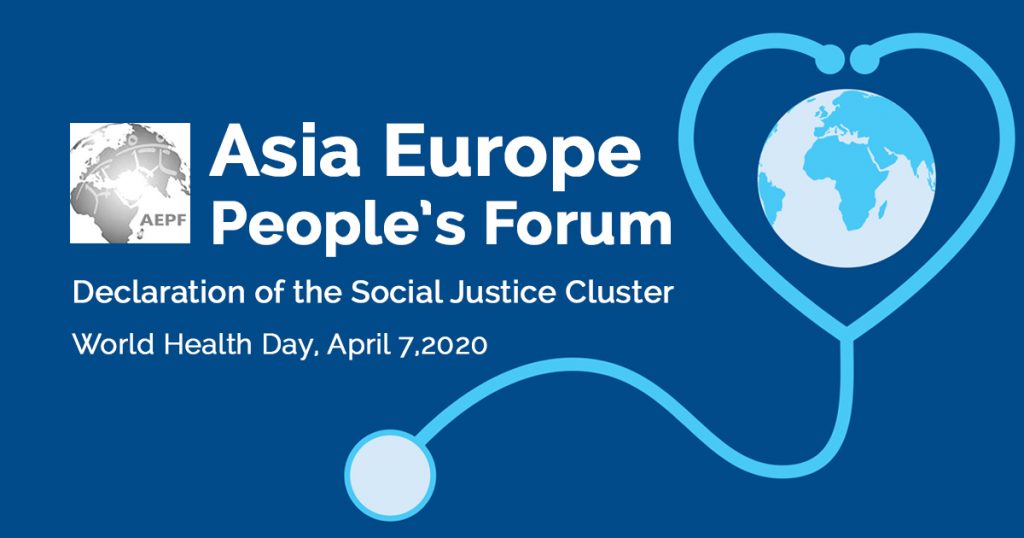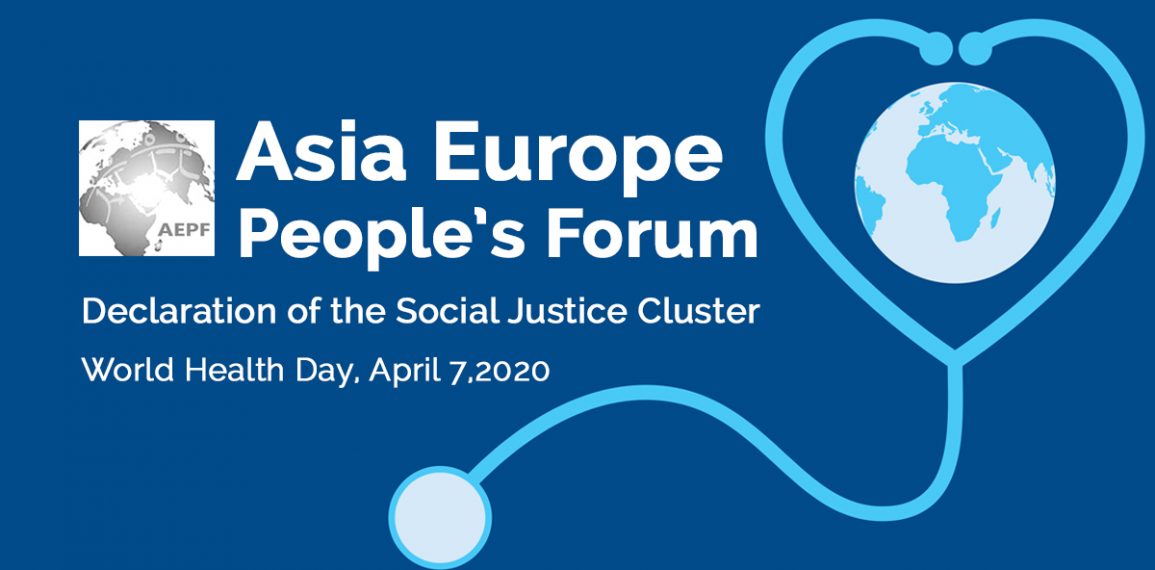Asia Europe People’s Forum: Declaration of the Social Justice Cluster On World Health Day, April 7,2020
The Social Justice Cluster calls for the establishment of public and universal health systems, a revaluation of so-called “reproductive” work and taking into account the social health determinants and the real needs of the people
The coronavirus crisis is a wake-up call and a warning all over the world. Governments from the North and South are helpless, health systems are failing, everyone, especially the sick and informal workers are the victims.

Governments presented precautionary measures that are blind to the social and economic realities of the population. Confinement is a solution only if you actually have a house; the recommendation to wash your hands is only valid if you have soap and water; the anti-bacterial gel is only available to those with income; proper nourishment is only possible for those with money to buy healthy food… In other words, to avoid the virus, it is better not to be poor, an informal worker or homeless.
The failings of our social systems worsen the health situation. For those who are sick, in too many cases there is no access to free and effective health care; for those who lose their jobs, too often there is no sickness allowance. Faced with this situation, too many patients prefer to ignore the risks and contaminate their neighbours, their colleagues, their families.
Our frontline- doctors, nurses and other health workers, expected to save the lives of the sick, are often unprotected themselves and their lives are in danger, whereas their working conditions are unacceptable.
In short, this crisis shows us how decades of privatization and austerity policies have seriously undermined the ability of states to care for their populations in the event of an epidemic.
This is why the social justice cluster of AEPF urgently requests:
1) The establishment of public universal social protection systems. These systems will be based on rights and solidarity, not for profit. For that, it will be necessary to put an end to austerity policies and to set up taxation systems at national and global level so that all can contribute to and benefit from this social protection.
2) It is also necessary to look beyond traditional social protection policies and care for the means of meeting people’s basic needs:
- Access for all, as a matter of right, to life’s essentials, including clean water, decent housing, education and adequate nutrition for all
- Guaranteed income systems must be put in place in case of unemployment
- Labor laws must provide sickness benefits
- To recognize and value paid and unpaid care work
- Safe and affordable medicines
3) Apart from these few elements of emergency policies, it is also necessary to prepare for the future and put into place legislation so that:
- People can have popular education systems so that they know their rights and duties in the event of an epidemic as well as get information on disease prevention and treatment
- Research can be funded so the world is better prepared for other viruses and other epidemics
- Patents on possible vaccines and medicines are in the domain of global commons and cannot be monopolized by States or pharmaceutical companies
4) Finally, it is imperative to reflect on environmental and agricultural policies in order to reduce the risks of endangering biological diversity and gear health systems towards the prevention of risks.
Faced with these multiple elements which are directly linked to the coronavirus crisis, it is obvious that effective solutions go far beyond health systems and social protection. In fact it is about our entire economic system so that the real and urgent needs of the people can be taken into account. Markets have proven to be utterly inadequate for this task. Indeed, it is not enough to “fight poverty”, it is absolutely necessary to put an end to the production of poverty. It is therefore not enough to ‘redistribute’ wealth either, it is the primary production of wealth that will have to be put on track differently. The crisis clearly shows that so-called “reproductive” work must take a central place in our social organization. Also, the immense funding of militarization must stop in order to sufficiently provide health care systems in particular and social protection in general with sufficient resources.
AEPF underlines that such policies require social and democratic transformation, in order to set up participatory processes.
To that end, the Social Justice Cluster of AEPF has drafted a Global Charter for Universal Social Protection Rights. We invite all to endorse it and work towards the realization of these rights.
www.globalsocialprotectioncharter.eu




